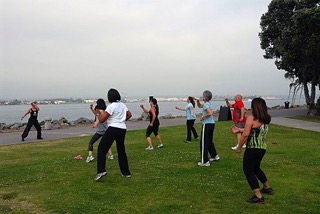
If there were just one magic bullet to feel and function better, it would probably be exercise. Countless studies show the numerous benefits of exercise. Our bodies and brain were designed for constant physical activity and perform at their best when we provide that. Exercise releases chemicals that boost your overall energy and dampen inflammation.
But what to do if exercise actually makes you feel worse? Some people battling autoimmunity or brain inflammation suffer from exercise intolerance and see their symptoms worsen after physical activity.
Many autoimmune and brain inflammation patients see multiple doctors before receiving a diagnosis. Most of these doctors will tell a severely compromised patient they just need to exercise more. This advice can actually worsen a patient’s symptoms until they start bringing their inflammation under control.
What is exercise intolerance?
In the conventional medical model, exercise intolerance is most often associated with heart disease, particularly from the heart not filling adequately with blood. As a result, insufficient blood is pumped out to the rest of the body.
However, in functional medicine we frequently see exercise intolerance in people struggling with autoimmunity and brain inflammation.
It’s normal to feel sore or tired after a tough workout, but people who suffer from exercise intolerance experience more severe and unusual pain, fatigue, a flare up of their autoimmune symptoms, nausea, vomiting, or other negative effects that go beyond normal muscle tiredness. Some “crash” for a day or more with flu-like symptoms, feeling unable to get out of bed or function normally.
Exercise intolerance can be very emotionally distressing for people who care about their health and are working to improve it. Afterall, we are constantly bombarded with images of uber athletes and messaging about intense workouts.
What causes exercise intolerance?
When exercise intolerance is related to autoimmunity or brain inflammation, exercise intolerance is a result of compromised mitochondria.
Mitochondria are known as the “energy factories” inside each cell, as their role is to take nutrients and oxygen and turn that into energy.
Unfortunately, mitochondria are also very sensitive to inflammation and will under function when the body is struggling with intense inflammation. This means the cells don’t function well, the brain under functions, and you generally feel crappy and fatigued.
How to exercise if you have exercise intolerance?
One of the most common mistakes people make is to push themselves too hard and over exercise. Over training spikes inflammation and can make an autoimmune or brain inflammation condition worse.
Also, when you have an inflammatory condition, you must realize your immune system is never at a constant. Stress, viruses, diet, and myriad other factors keep our immune systems in a constant state of fluctuation.
People with autoimmunity or brain inflammation must always tweak and adjust their activity level to not overburden their immune system or neurological health.
If you are used to working out a certain level and then suddenly notice your workout make you feel worse, it could be an outside factor flaring up inflammation. So you need to dial it down or even take some time off. Listen to your body.
For instance, someone who does high-intensity interval (HIIT) and weight traning four or five days a week suddenly feels fatigued and lethargic the day after each class. They may need to reduce the duration, the intensity, or the frequency of those workouts, or substitue in something that doesn’t push their inflammation over the edge, like a brisk walk.
Forget about cultural messaging around fitness
Managing autoimmunity and brain inflammation is highly individualized; no two people will have the same protocol. You must always be tuned in to what your body says. This can be difficult in our hyped-out fitness culture.
After all, for some autoimmune or brain inflammation folks, the mildest workouts can be triggering. The goal is to find what works for you and makes you feel good. When we stimulate blood flow through movement, it sends more oxygenation to our bodies and brains and triggers the release of beneficial chemicals. If it feels good, it’s lowering inflammation and helping you manage your autoimmunity and brain inflammation.
Autoimmune appropriate exercises for building exercise tolerance could be walks, light weight training, gentle yoga or stretching routines, water aerobics — explore and find what works for you. You are the ultimate expert on what’s right for your body. As you start to feel better you will naturally feel inclined to take on more.
Start low and slow so that you are able to stay consistent and keep it up on a daily basis. Once you have established that, then gradually increase intensity and duration.
Ask my office for more advice on managing autoimmunity or brain inflammation.



Latest from the Blog
Autoimmune Disease Management with EBOO Therapy
July 17, 2024Autoimmune diseases, characterized by the immune system attacking the body’s own tissues, present significant challenges in treatment and management. Extracorporeal Blood Oxygenation and Ozonation (EBOO) therapy offers a promising adjunctive approach to managing autoimmune conditions. Functioning similarly to a dialysis machine, EBOO filters the blood to remove toxins and pathogens that may trigger autoimmune responses. […] Read more
Latest from the Blog
Detoxification and EBOO Therapy: Optimizing Cellular Health
Detoxification plays a crucial role in maintaining optimal health in today’s toxin-laden environment. Extracorporeal Blood Oxygenation and Ozonation (EBOO) therapy offers a sophisticated approach to detoxifying the bloodstream and enhancing overall well-being. Operating similarly to a blood filtration system, EBOO effectively removes toxins, pesticides, and chemicals that accumulate in the body, supporting the body’s natural […] Read more